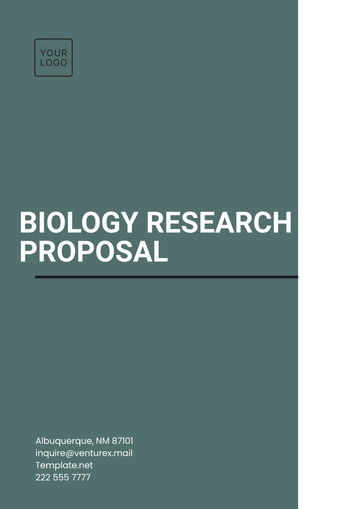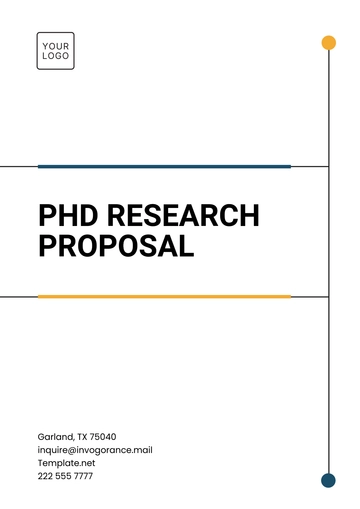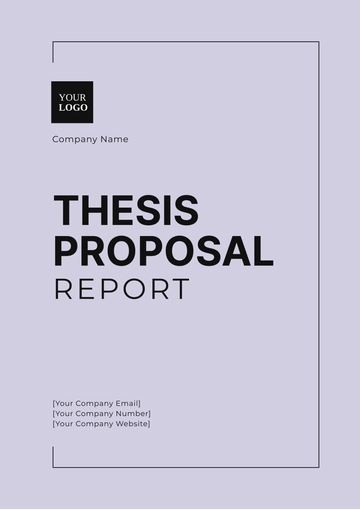Free Biology Research Proposal

Prepared By: [Your Name]
I. Abstract
The goal of this research is to investigate the cellular and molecular mechanisms that cause autoimmune diseases, where the immune system erroneously attacks the body’s tissues, resulting in chronic inflammation and tissue damage, by using cell biology, molecular biology, and advanced imaging techniques to identify key biomarkers and signaling pathways, to develop new diagnostic tools and targeted treatments to enhance clinical outcomes for affected patients.
II. Introduction
Autoimmune diseases such as rheumatoid arthritis, systemic lupus erythematosus, and multiple sclerosis impact millions globally and pose a major public health challenge, stemming from a malfunctioning immune system that mistakenly targets and destroys the body's tissues, causing persistent inflammation. Though research has advanced in deciphering immune system dynamics, the exact mechanisms triggering autoimmunity are still not fully comprehended, making it essential to bridge these knowledge gaps to create better, targeted treatments that can stop or reverse the progression of these diseases.
III. Literature Review
Significant progress has been made in identifying key cellular and molecular players involved in autoimmune diseases. Recent studies have highlighted the following:
T-cell involvement in autoimmunity: T-cells play a central role in recognizing and responding to antigens. In autoimmune diseases, autoreactive T-cells escape central tolerance and initiate an immune response against self-antigens (Jones et al., 2021).
Genetic predispositions: Specific genetic mutations and polymorphisms have been linked to an increased risk of developing autoimmune diseases. These genetic factors can influence immune system regulation, leading to aberrant immune responses (Smith & Lee, 2020).
Environmental influences: Environmental factors, such as infections, toxins, and lifestyle factors, can act as triggers or modulators of autoimmune diseases, potentially influencing the onset and progression of these conditions (Brown et al., 2019).
While these studies have identified potential pathways and cellular players, there remains a critical need to translate these molecular insights into clinically applicable interventions.
IV. Objectives
This research aims to achieve the following objectives:
Identify cellular biomarkers that are indicative of autoimmune activity and could serve as diagnostic tools.
Elucidate signaling pathways that contribute to immune system dysregulation in autoimmune diseases.
Develop targeted therapeutic strategies based on the molecular pathways identified, with the potential to improve treatment outcomes.
V. Methods
To accomplish these objectives, we propose a comprehensive experimental approach that combines multiple advanced biological techniques:
Cell Culture: We will culture immune cells, including T-cells and antigen-presenting cells, derived from both healthy individuals and patients with autoimmune diseases. This will allow us to compare cellular behaviors and responses under controlled conditions.
Flow Cytometry: This technique will be employed to analyze the composition of immune cell populations and to quantify the expression of specific biomarkers associated with autoimmunity.
Western Blotting: We will use Western blotting to detect and quantify the expression levels of proteins involved in autoimmune signaling pathways, providing insights into their roles in disease pathogenesis.
CRISPR-Cas9 Gene Editing: We will utilize CRISPR-Cas9 technology to selectively knock out or modify genes implicated in autoimmunity. This will allow us to assess the functional impact of specific genes on immune cell behavior and disease development.
Advanced Microscopy: Imaging techniques such as confocal and super-resolution microscopy will be used to visualize cellular interactions and the localization of key proteins within immune cells, providing a detailed understanding of the cellular dynamics in autoimmunity.
VI. Expected Results
Through this research, we expect to identify novel biomarkers and signaling pathways that play a pivotal role in the onset and progression of autoimmune diseases. The anticipated outcomes include:
Development of enhanced diagnostic tools that enable early detection of autoimmune diseases, potentially improving patient prognosis.
Identification of novel therapeutic targets for drug development, leading to more effective and less toxic treatments for autoimmune conditions.
Improved understanding of disease etiology, contributing to the broader field of immunology and opening new avenues for research and treatment.
VII. Discussion
Identifying key biomarkers and pathways could transform autoimmune disease diagnosis and treatment, allowing us to target cellular mechanisms for more precise, personalized, and side-effect-free therapies, while also offering insights into other chronic inflammatory diseases and fostering new therapeutic innovations across different conditions.
VIII. Conclusion
This research proposal details a strategic plan to explore the molecular basis of autoimmune diseases, using advanced technologies and methods to address important gaps in medical understanding, and to advance diagnostics and targeted treatments, ultimately aiming to enhance patient care and quality of life through new clinical management insights.
IX. References
Brown, A., Green, B., & Taylor, C. (2019). Environmental factors influencing autoimmunity. Journal of Immunological Research, 45(2), 123-129.
Jones, D., Smith, E., & Kim, F. (2021). T-cell mediated mechanisms in autoimmune diseases. Cellular Immunology, 97(1), 205-215.
Smith, J., & Lee, K. (2020). Genetic predispositions in autoimmune disorders. Genetic Reviews, 56(3), 87-94.
- 100% Customizable, free editor
- Access 1 Million+ Templates, photo’s & graphics
- Download or share as a template
- Click and replace photos, graphics, text, backgrounds
- Resize, crop, AI write & more
- Access advanced editor
Advance your biological studies with Template.net's Biology Research Proposal Template. This editable and customizable template helps you organize your research objectives, methodology, and expected outcomes in a clear and structured manner. Editable in our AI Editor Tool, it ensures your biology research proposal is comprehensive, well-organized, and persuasive, making it easier to secure funding and support for your biological research endeavors.
You may also like
- Business Proposal
- Research Proposal
- Proposal Request
- Project Proposal
- Grant Proposal
- Photography Proposal
- Job Proposal
- Budget Proposal
- Marketing Proposal
- Branding Proposal
- Advertising Proposal
- Sales Proposal
- Startup Proposal
- Event Proposal
- Creative Proposal
- Restaurant Proposal
- Blank Proposal
- One Page Proposal
- Proposal Report
- IT Proposal
- Non Profit Proposal
- Training Proposal
- Construction Proposal
- School Proposal
- Cleaning Proposal
- Contract Proposal
- HR Proposal
- Travel Agency Proposal
- Small Business Proposal
- Investment Proposal
- Bid Proposal
- Retail Business Proposal
- Sponsorship Proposal
- Academic Proposal
- Partnership Proposal
- Work Proposal
- Agency Proposal
- University Proposal
- Accounting Proposal
- Real Estate Proposal
- Hotel Proposal
- Product Proposal
- Advertising Agency Proposal
- Development Proposal
- Loan Proposal
- Website Proposal
- Nursing Home Proposal
- Financial Proposal
- Salon Proposal
- Freelancer Proposal
- Funding Proposal
- Work from Home Proposal
- Company Proposal
- Consulting Proposal
- Educational Proposal
- Construction Bid Proposal
- Interior Design Proposal
- New Product Proposal
- Sports Proposal
- Corporate Proposal
- Food Proposal
- Property Proposal
- Maintenance Proposal
- Purchase Proposal
- Rental Proposal
- Recruitment Proposal
- Social Media Proposal
- Travel Proposal
- Trip Proposal
- Software Proposal
- Conference Proposal
- Graphic Design Proposal
- Law Firm Proposal
- Medical Proposal
- Music Proposal
- Pricing Proposal
- SEO Proposal
- Strategy Proposal
- Technical Proposal
- Coaching Proposal
- Ecommerce Proposal
- Fundraising Proposal
- Landscaping Proposal
- Charity Proposal
- Contractor Proposal
- Exhibition Proposal
- Art Proposal
- Mobile Proposal
- Equipment Proposal
- Student Proposal
- Engineering Proposal
- Business Proposal





























